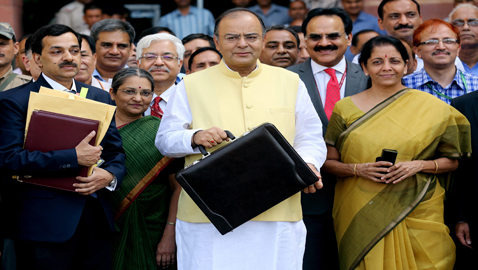Corporate and industry leaders voice their opinion on the NDA government’s second budget since coming to power in May 2014. India Inc. is hopeful that the government will utilise its first full-term budget to announce a slew of measures to boost economic growth, kick-start investment in infrastructure development, and give a fillip to industry.
‘Favourable policy for engineering equipment’
– K. Shanker, Head – Onshore & Overseas Business, Technip India Ltd

We would like to see more transparency in the transfer pricing which will attract and encourage more investment inflow from MNCs into India. This is important as many countries apply their own variations of the Arm’s Length Principle (ALP) in their transfer pricing regulations. Transfer pricing is critical for MNCs as it directly influences how taxable income is distributed among different countries having various tax rates, thus impacting after tax-free cash flow. We need a more transparent and simplified process in place.We need a favourable policy framework which will be conducive for the production of engineering equipment and EPC industry products manufactured in India. This would be in line with ‘Make in India’ campaign initiated by Prime Minster Narendra Modi. Attractive incentive structure for capital investment will encourage and see the growth of homegrown companies and entrepreneurs in India.In order to create large-scale employment opportunity and to give a fillip to industry growth, the government should focus on making PCPIR a reality. Conceptually, PCPIR, a specifically delineated investment region planned for the establishment of production facilities for petroleum, chemicals and petrochemicals, is a great initiative to promote the energy sector in India, but we are yet to see a full-scale implementation of this.
The government should look at a market-driven long-term gas policy as it will help in stabilising gas prices over the long term. There is a serious concern as to the dip in oil prices worldwide. We have to wait and watch how this would stabilise before we can plan for any eventuality. These are the phases in industry circle, but yes, oil price drop had an immediate effect on the upstream industry and as a result a couple of projects are being kept on hold for the time being.
There should be a favourable environment to revive the fertiliser sector investment to bridge the gap between supply and demand through domestic production.
‘Ensure stricter qualification in bid selection’
— Sivasubramanian Natarajan, MD, ThyssenKrupp Industries India Pvt. Ltd
The budget session of Parliament is critical for a number of reasons.  It is expected that the government will pass the ordinances it issued last month on coal block auctions, mining regulations, land acquisition and higher FDI in the insurance sector to prevent them from lapsing. Keeping in mind the GST implementation date of April 2016, the government would consider making adequate budgetary provisions for upgradation of tax infrastructure.
It is expected that the government will pass the ordinances it issued last month on coal block auctions, mining regulations, land acquisition and higher FDI in the insurance sector to prevent them from lapsing. Keeping in mind the GST implementation date of April 2016, the government would consider making adequate budgetary provisions for upgradation of tax infrastructure.
Reliable power supply is critical for the Indian economic development and efficient improvement of manufacturing. The recent decision of the government to go for e- auction of the mines has attracted investors and will reduce fuel availability risks. This will support the growth of the coal mining industry and provide fillip to mechanisation of mines. The most critical requirement in the coal mining industry is to improve the productivity, reduce the environmental impact and substantially reduce the cost of the mined coal at the power station.
The government has to provide security to the investors to ensure that their investments are safe and needs to be more transparent and implement long-term policies for land acquisition, faster environment clearance and allocation of natural resources in order to augment infrastructure development.
The government must ensure stricter qualification requirement in selecting the bidder so that only the companies with long-term interest are able to qualify. The tax system must be made more transparent and not subject to any interpretation. A high quality road and rail infrastructure will help in ensuring the logistic costs are minimised.
‘Streamline taxes levied on real estate sector’
— Manju Yagnik, Vice Chairperson, Nahar Group
 Budget 2015-2016 will be the first budget from the new government and there is a lot of expectation from all walks of life. Real estate industry, too, is looking forward to a favourable budget for this sector. This sector has been demanding industry status. This will bring around a sea change in the whole sector. It has also been indicated that there will be further tax concession which will bring in more liquidity in the economy giving boost to higher consumption.
Budget 2015-2016 will be the first budget from the new government and there is a lot of expectation from all walks of life. Real estate industry, too, is looking forward to a favourable budget for this sector. This sector has been demanding industry status. This will bring around a sea change in the whole sector. It has also been indicated that there will be further tax concession which will bring in more liquidity in the economy giving boost to higher consumption.
For real estate sector, we expect streamlining of tax which is levied on this sector. Housing today is a necessity and an expensive proposition. If the buyer is taxed and burdened above all this, many will not afford to buy a house. Provision to be kept for Rs.1 Lakh under 80c exclusively for the payment of principal borrowed as loan for real estate. Also, there should be tax rebate on the income generated from rentals. This needs to be looked at differently to increase rental housing segment.
Government should give incentives for sustainable and certified green buildings and for constructing affordable housing. Government should have access to pension, insurance and PF funds for investing in infrastructure and housing investments. A well-supported investment towards infrastructure will not only help this sector grow but will increase employment and quality of life.
ECB limit should be increased to $5 billion and should be accessible through the banking and HFC channels.
‘Government should address infra deficit’
— Sanjeev Ranjan, MD, International Copper Association India
 This will be the first full budget which the current government will be tabling and since we have the majority government in place, the expectations are high and the industry is looking for a revival which will kick start the economic activity. Infrastructure deficit is widely considered to be one of the factors that could severely impede India’s economic growth. The present policymakers have recognised this and have made concerted efforts to accelerate infrastructure development. In infrastructure sector, its power and real estate sectors where maximum copper gets consumed in form of power equipment which includes transformers and wire and cables. These sectors are key elements in playing out the India growth story.
This will be the first full budget which the current government will be tabling and since we have the majority government in place, the expectations are high and the industry is looking for a revival which will kick start the economic activity. Infrastructure deficit is widely considered to be one of the factors that could severely impede India’s economic growth. The present policymakers have recognised this and have made concerted efforts to accelerate infrastructure development. In infrastructure sector, its power and real estate sectors where maximum copper gets consumed in form of power equipment which includes transformers and wire and cables. These sectors are key elements in playing out the India growth story.
Currently, there exists large demand supply gap in power generation. The Government of India has planned to add 88,000 MW of generation capacity during the 12th Plan by 2017. This will in turn create requirements for T&D with growth in power generation and demand to evacuate power generated. The investment in T&D sector is estimated to be around Rs.70,000 crore to provide estimated annual growth of 20 per cent in transmission capacity.
This is going to be a big driver for transformer industry as we expect demand will not only come from fresh power addition but also from replacement of old distribution transformers. Nearly 40-50 per cent of the distribution transformers are in need to be replaced if we wish to cut down on out T&D losses estimated to be around 3-8 per cent. It’s estimated that for each 1 MW additional power generation capacity, 7 MVA transformer capacities are required. The transformer market is our largest market for copper in India and has an estimated manufacturing capacity of around 300 to 350GVA which is 140 per cent more than the around 250GVA transformation capacity anticipated to be added by end of the 12th Plan.
‘I wish something more concrete for smart energy’
— Vinod Raphael, Country Business Head, OMRON Electronic and Mechanical Components, India
 Thinking in line with the ‘Make in India’ initiative, I feel that a cutback in the corporate tax will be genuinely helpful in making India an attractive business destination. Though it is not the highest globally, however it is proving to be cumbersome; contributing towards making India a difficult place to run a business. MNCs would really feel more motivated to invest in India if the corporate tax goes down as it will have a positive impact on the cost of doing business in the long run.
Thinking in line with the ‘Make in India’ initiative, I feel that a cutback in the corporate tax will be genuinely helpful in making India an attractive business destination. Though it is not the highest globally, however it is proving to be cumbersome; contributing towards making India a difficult place to run a business. MNCs would really feel more motivated to invest in India if the corporate tax goes down as it will have a positive impact on the cost of doing business in the long run.
I also wish this budget would have something more concrete for the smart energy segment, especially the smart meters. As indicated by Ministry of Power, in 2013, India is supposed to have smart meters across all households by 2027. Considering the objectives of optimal energy management, it would be really beneficial if some more initiatives can be rolled-out to spur their adoption so that this target is achieved much earlier… say by 2022.
‘A further boost for affordable housing’
— Hari Prakash Pandey, VP – Finance and Investor Relations, HDIL
 We expect that this budget will be growth oriented, one that would fuel investments, and through reform measures and stable taxation policies, facilitate ease of doing business in India. Even though there have been a slew of reform announcements in recent times, one expects to hear some more reformative measures being announced on the floor of Lok Sabha during this budget session.
We expect that this budget will be growth oriented, one that would fuel investments, and through reform measures and stable taxation policies, facilitate ease of doing business in India. Even though there have been a slew of reform announcements in recent times, one expects to hear some more reformative measures being announced on the floor of Lok Sabha during this budget session.
Granting ‘infrastructure’ status to the real estate sector and a single-window clearance mechanism have been two of our long pending demands. These would enable easy flow of funds to the sector and fast track the approval process thereby enabling removal of impediments from the growth of the real estate sector. We expect further boost for the affordable housing sector. Formal announcement of implementation of GST (Goods and Services Tax) will be a key booster for the overall economy.
‘Liberalise and allow FDI in other segments’
— Mohit Goel, CEO, Omaxe Ltd
 Post-interim Budget, where a number of positive announcements were made, the macroeconomic indicators have improved with inflation and industrial growth showing positive signals. The coming budget is expected to continue with positive policy changes in order to improve business environment and give strong push to growth. Government has been moving steadily on Smart Cities and the budget will have a lot of announcements on this front including the broader contours. With several countries pledging support including the US, Singapore etc., Smart Cities will bring in a lot of opportunities for private developers.
Post-interim Budget, where a number of positive announcements were made, the macroeconomic indicators have improved with inflation and industrial growth showing positive signals. The coming budget is expected to continue with positive policy changes in order to improve business environment and give strong push to growth. Government has been moving steadily on Smart Cities and the budget will have a lot of announcements on this front including the broader contours. With several countries pledging support including the US, Singapore etc., Smart Cities will bring in a lot of opportunities for private developers.
The government must further liberalise and allow FDI in other segments, after allowing the same in construction and affordable housing. The government must reintroduce tax benefit under section 80IB (10) of the IT Act in order to overcome the supply gap and fulfill the vision of Housing for All by 2022. This benefit should also be extended to Smart Cities, affordable housing and redevelopment.
‘Growth prospects look better than last year’
— Anubhav Jain, Director, Silverglades
 In this budget we expect the government to continue with positive policy announcements to improve business environment and give strong push to growth. This year the growth prospects look better than last year for all sectors and as a developer we expect a lot in terms of attention and revenue for the sector. The long pending demand to announce real estate sector as an industry is foremost concern. The government should also ensure quick passage of Goods and Service Tax which will replace numerous taxes and help the consumers. The deduction for interest on housing loans needs to increase from the current limit. Removal of numerous taxes can encourage real estate sector on a large scale.
In this budget we expect the government to continue with positive policy announcements to improve business environment and give strong push to growth. This year the growth prospects look better than last year for all sectors and as a developer we expect a lot in terms of attention and revenue for the sector. The long pending demand to announce real estate sector as an industry is foremost concern. The government should also ensure quick passage of Goods and Service Tax which will replace numerous taxes and help the consumers. The deduction for interest on housing loans needs to increase from the current limit. Removal of numerous taxes can encourage real estate sector on a large scale.
‘We’re looking for a reformist budget’
— Lalit Kumar Jain, Chairman, CREDAI, and CMD, Kumar Urban Development Pvt. Ltd
 With lots said and positive hopes shown in the first budget by the NDA government, expectations are high of a massively reformist Union Budget that would give the somnolent economy the jolt it badly needs.
With lots said and positive hopes shown in the first budget by the NDA government, expectations are high of a massively reformist Union Budget that would give the somnolent economy the jolt it badly needs.
Prime Minister Narendra Modi appears to be taking calculated measures towards his vision of a ‘Shresht Bharat’. One sincerely hopes that Finance Minister Arun Jaitley will outline a comprehensive plan to boost economic growth by reviving investments and narrowing fiscal deficit. In short, the budget will be first glimpse into the framework of the new government’s economic agenda for the coming years.
There are quite a lot of aspects that need immediate consideration for action as we lost a lot of time in empty promises and hollow talk.
Affordable housing policy is the need of the hour and everybody talks about it and none doing anything about it. The least the government can do is to implement the recommendations of a task force of appointed by the government.
First of all, housing deserves the status of an industry and affordable housing priority treatment with direct and indirect tax concessions since it addresses the needs of the poor.
The recent cut in repo rate is a “good beginning,” though “This is not enough.”
What is needed is a rollback of all liquidity tightening measures and easing the situation to make cost of funding for both home buyers and developers cheaper than what it is today. A reduction of 200 basis points (reduction of interest rate by 2 per cent) within a short span is needed. And if the RBI does not act, the government must take appropriate steps to ease fund restrictions for realty.
RBI also needs to look at the housing sector favourably, and certainly not with negative weightage, as it contributes handsomely to the GDP apart from generating large-scale employment across other dependent industries as well.
‘Provide on-ground impetus for affordable housing’
— Anuj Puri, Chairman & Country Head, JLL India
 In the previous nine-month budget, the new government outlined its vision for boosting affordable housing. From the upcoming 12-month budget, the Indian real estate sector looks forward to provisions that firm this vision up on the ground.
In the previous nine-month budget, the new government outlined its vision for boosting affordable housing. From the upcoming 12-month budget, the Indian real estate sector looks forward to provisions that firm this vision up on the ground.
Provide tax incentives to boost rental housing segment: The Union Budget needs to provide tax incentives for renting out of residential properties. Currently, rental income is treated as normal taxable income. Providing tax breaks specific to rental income will give a significant boost to rental housing segment in the country, and help increase rental supply in the metros.
Enable faster project approvals: Developers have been campaigning for a faster project approval process for good reasons. Faster approvals would beef up the supply pipeline, help bring prices down and also ensure that real estate remain viable as a business. The budget should provide suitable relief on this front, while simultaneously ensuring that construction quality norms are not compromised in the process and that faster approvals do not result in support infrastructure failure in new precincts being developed.
Implement Real Estate Regulatory Bill: The approval of the pending Real Estate Regulatory Bill was deferred once again only recently. It must now be implemented so that the Indian real estate market becomes attractive for foreign investors. The upcoming budget should make this vitally required policy a reality and put an end to the suspense.
Relax counter-productive clauses in Land Acquisition, Rehabilitation and Resettlement Act: The LARR (Land Acquisition, Rehabilitation and Resettlement) Act, formulated and reformulated several times, has so far failed to counter land-related bureaucracy in India and has to date done quite the opposite. In its current form, it is a deterrent for developers as well as institutional investors. The real estate sector is desperate to get past this hurdle, because a lot more land must be made available for primary real estate development as well as for infrastructure development. Given the new government’s focus on ‘housing for all’, fast-tracking of infrastructure and the creation of 100 smart cities across the country, the budget should present a workable and streamlined LARR Act, with significant relaxation in the currently tedious rehabilitation clauses and other norms.
Fast-track REITs: Many overseas investment funds have so far abstained from the Indian real estate market because of the lack of regulation, political instability and bureaucratic quagmire. The new government has the opportunity of making Indian real estate more investment-friendly and attractive by introducing a revised tax code. Until vital changes to overcome the tax hurdles, REITs, which can literally be a lifesaver for Indian real estate, cannot take off. In the interest of the real estate sector as well as the overall economy, the Budget must address this issue.
Encourage FII participation in infrastructure: India is still an infrastructure deficient country and needs large investments to help bridge the infra gap. The Union Budget should make more provisions to increase foreign investors’ participation in this sector.
‘Infra development should be primary focus’
— Kamal Khetan, CMD, Sunteck Realty Ltd
 Pacing up infrastructural development should be the primary focus of the government. Infrastructure is important when it comes to real estate development being viable not only in new micro markets but also in established micro markets that have witnessed stagnation on account of an infrastructure deadlock.
Pacing up infrastructural development should be the primary focus of the government. Infrastructure is important when it comes to real estate development being viable not only in new micro markets but also in established micro markets that have witnessed stagnation on account of an infrastructure deadlock.
Easing interest rate should be another primary focus of the union budget. Real estate industry would be positively affected by it as cutting down interest rates means an increased liquidity flow in the economy. Consequently, real estate will reap rich dividends. Moreover, if banks cut down the loan interest rate, buyers with disposable income would invest in the realty sector.
Single-window clearance system must be introduced. Due to complexities of government channels, many projects get halted and delivery is delayed. A speedy completion of stalled projects is essential.
Clearer and loophole-free policies are shall be introduced. Frequent change in policies and regulations affect the construction. A clearer, faster and more transparent execution is needed.
Macro investment initiatives to boost REITs and FDI that encourage and foster development of the country at large and usher in a demand and supply balance need to assume key focus.
‘Growth incentivised policies for real estate sector’
— Rajesh Prajapati, MD, Prajapati Constructions Ltd
 There is an urgent need for the new government to focus with growth incentivised policies for the real estate sector in the country. Our wish list would be giving industry status to the real estate industry, bringing down interest rates on housing loans, removing or at least reducing service tax substantially, income tax exemption for affordable homes built for EWS and LIG, and borrowing for construction companies to be available at lower interest rates.
There is an urgent need for the new government to focus with growth incentivised policies for the real estate sector in the country. Our wish list would be giving industry status to the real estate industry, bringing down interest rates on housing loans, removing or at least reducing service tax substantially, income tax exemption for affordable homes built for EWS and LIG, and borrowing for construction companies to be available at lower interest rates.
The key areas that government needs to prioritise its focus would be providing finance to housing industry at lower cost and creating an atmosphere where approval mechanism is faster. Also, focus on easing norms for buying land as it is the basic raw material.
‘Create multimodal hubs for transporters’
— Vineet Agarwal, MD, Transport Corporation of India Ltd
 TCI hails the decision of the government to bring surface transport and shipping under one umbrella as a bold step that will lead to faster decision-making by ensuring better coordination among ministries and departments. The government should focus its attention on making the sector more competitive.
TCI hails the decision of the government to bring surface transport and shipping under one umbrella as a bold step that will lead to faster decision-making by ensuring better coordination among ministries and departments. The government should focus its attention on making the sector more competitive.
The following recommended initiatives will take the sector forward: industry status and an integrated policy for the logistics sector; multimodal policy for the domestic market; regulatory framework; long-term planning and financing for the sector; and law of subrogation.
Under infrastructure focus, create multimodal logistics hubs to give transporters the choice of best modes. Man interstate check-posts adequately and create government warehouses to ensure safe custody of goods which are not allowed to enter into states due to sales tax documents. Separate warehousing space for cargo handling and storage apart from vehicle waiting facility at airports.
‘Budget should enhance growth in real estate sector’
— Shailesh Puranik, MD, Puranik Builders
 The real estate industry is very hopeful about the financial budget to be announced. We have seen a series of favourable policies being announced in the past few months. Keeping the same mode, we are expecting a slew of policies that would enhance growth in the real estate sector. We are also expecting that this budget will fulfill some long pending demands of the sector such as granting of industrial status to the real estate sector and single-window scheme to speed up the clearances for projects. We expect the government’s intervention through budget to reduce taxes and interest rates for home buyers and encourage them to purchase their dream home.
The real estate industry is very hopeful about the financial budget to be announced. We have seen a series of favourable policies being announced in the past few months. Keeping the same mode, we are expecting a slew of policies that would enhance growth in the real estate sector. We are also expecting that this budget will fulfill some long pending demands of the sector such as granting of industrial status to the real estate sector and single-window scheme to speed up the clearances for projects. We expect the government’s intervention through budget to reduce taxes and interest rates for home buyers and encourage them to purchase their dream home.
‘Need of the hour is infra status to housing’
— Prabhat Ranjan, CMD, Olympeo Infrastructure Pvt. Ltd
 With the budget around the corner and the positive sentiments from the new government towards realty sector, expectations from the industry are soaring all time high.
With the budget around the corner and the positive sentiments from the new government towards realty sector, expectations from the industry are soaring all time high.
Foremost, we expect our finance minister to announce the most awaited single-window time bound clearance of realty projects. It shall have maximum impact on industry and with faster approvals, project delivery time would come down substantially which will result into property prices down by 10-15 per cent.
The budget is expected to outline a vision on boosting affordable housing and confer this segment with infrastructure status. This would bring down cost of borrowing for developers and can increase the financial viability much needed for this sector. In addition, to boost affordable housing segment taxes should be rationalised, especially stamp duty, service taxes, special interest rate for this segment and tax incentive to the developers. Moreover, the budget should provide blueprint of smart cities and REITs that has created a buzz but road map is eagerly awaited by the stakeholders.
Such policies, if implemented, will uplift the sector by making it organised. Key benefits being Infrastructure Status will help in getting longer term loans, lower interest rate and aid inflow of FDI in real estate. Tax benefits and low cost of borrowing to developers will provide favorable environment for creation of affordable homes. Tax benefits to buyers will boost the purchasing power of consumers thus balancing the demand-supply gap.
One key issue that needs to be addressed is the standardisation of fluctuations in building materials cost that directly impacts the appreciation of property prices. Though central real estate regulation bill is mandatory to organise this sector but it should not be implemented in such a way that it increases burden on developers of another cycle of approvals with possible delay.












